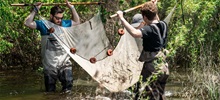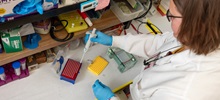About Keith Nolop
Keith Bradley Nolop, M.D., had a distinguished career of over 25 years in drug development from conception to approval with a focus on allergy, asthma, and cancer products. His work included the blockbuster drug Nasonex, a groundbreaking melanoma treatment, and highly-engineered cancer therapies. He studied biology at the University of South Dakota, where he was editor of The Volante newspaper and a member of Delta Tau Delta fraternity. He was elected to Phi Beta Kappa as a junior and graduated summa cum laude with a Bachelor of Science degree in 1975. His next stop was Vanderbilt University School of Medicine where he graduated first in his class. After receiving his Doctor of Medicine, he began a career in medical research and drug development. He died in May 2016 after a bicycle accident near his home in Pacific Palisades, California. His family honored Keith’s life and legacy by creating the Nolop Institute for Medical Biology from his estate.
“Keith was a celebration of what an individual can do in the science field and contributing to society and humanity,” said Keith's brother Bruce, a 1972 graduate of USD and former chief financial officer of E*Trade Financial. "He lived that dream."





